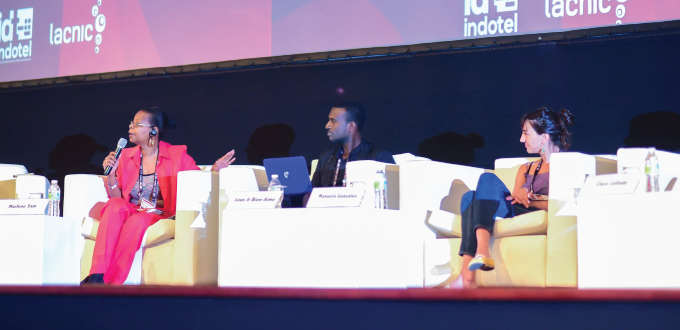LACNIC 31: Voices from the Community
30/05/2019

Members of one of the panels organized during LACNIC 31 shared with the audience four stories on the impact of the work of LACNIC and other regional organizations towards Internet development in Latin America and the Caribbean.
Members of the community and former participants of initiatives such as the online Campus; Ayitic Goes Global, the training and gender program; FRIDA, the awards and grants program, and LACNIC on The Move, LACNIC’s itinerant events shared their experiences and what they had learned in the process.
Carolina Caeiro, Development Project Coordinator at LACNIC, opened the panel by noting that all four initiatives seek to contribute to an open, stable and secure Internet. “For these projects we rely on community partners who are key players and contributors. The initiatives seek to serve vulnerable communities, contribute to the development of digital and technical skills and encourage the creation of community and the sharing of information,” Caeiro added.
In first person. First, Manuela Gonzáles Ursi of Atalaya Sur Community Networks and the winner of the FRIDA awards and grants programs, observed that the proposal submitted by her organization had worked in poor and vulnerable areas of Argentina in order to bring the Internet to communities that were not served by major operators. “The goal of Atalaya Sur was to promote popular appropriation of technology by working in three different areas: bringing connectivity to the communities, promoting technological vocations among these communities, and trying to encourage the production of local content,” said Gonzales Ursi.
Clara Collado of NIC.do then shared the takeaways that her community had achieved after the LACNIC on the Move event held in the Dominican Republic. She explained that this initiative had promoted the growth of IPv6 in the country and served to identify training opportunities for this protocol. “It was a way of helping people receive training and identify project funding opportunities,” Collado added.
Marlene Sam of Ecole Superieure d’Infotronique d’Haiti and Luis Jr. Bien-Aimé shared their experiences with Ayitic Goes Global, a training and gender project promoted in Haiti by LACNIC and the International Development Research Center (IDRC) of Canada.
Sam observed that Ayitic had provided training opportunities to help many “poor young women in underprivileged areas of Port-au-Prince” join the online job market. The courses attempted to empower these young women by offering training and offering a 12-week learning journey. “A selection process has been designed for the courses, which consists of helping the women understand that the training activities will prepare them to become professionals and use the Internet, not only as consumers, but also for earning an income while working from home,” Sam said.
In turn, Bien-Aimé spoke about the component on technical development of the Ayitic project, which focuses on strengthening ICT professionals and Internet infrastructure in Haiti.
To conclude, Carmen Denis, the fifth panelist, shared her experience as a student of LACNIC’s online Campus and how this learning platform was used by the University of Yucatán to train more than 30 of its professionals. “The Campus was vital for us. We took advantage of its course offerings not only for our personal benefit, but also to strengthen the training program for the team that manages the university network,” said Denis.
Watch the panel here